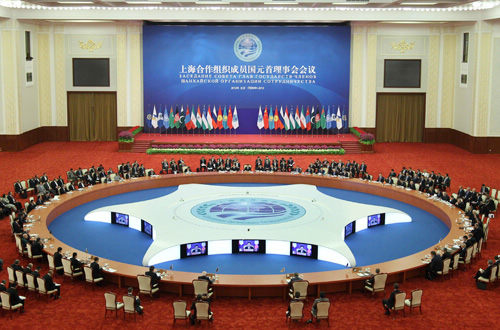|
 |
|
A MILESTONE SUMMIT: Representatives meet for the 12th SCO Summit at the Great Hall of the People in Beijing on June 7 (PANG XINGLEI) |
Eleven years ago, the Shanghai Cooperation Organization (SCO) began with just six members. This year, more than a dozen leaders from across Eurasia came to attend the SCO Summit in Beijing.
From June 6-7, the leaders discussed the future development of the SCO and reached consensus on the organization's economic and cultural exchanges and security cooperation.
Historic summit
This year is the first year of the SCO's second decade. During the past 11 years the SCO has played a significant role in maintaining peace and stability, while fostering bilateral and multilateral cooperation in the region.
Shi Ze, a senior research fellow with the China Institute of International Studies, stressed that this year's summit shouldered a mission of "carrying forward the tradition and forging ahead into the future." The leaders made a mid-term strategic plan for the SCO's development.
"They evaluated the international situation in the coming years, and designed the SCO's missions," said Shi. He said during the past years, the SCO's mission was to perfect its mechanism, and in the next 10 years its mission will be to push forward practical cooperation.
Being an influential governmental organization, the SCO has worked well on enhancing bilateral and multilateral high-level exchanges. The summit became an important occasion for SCO leaders to exchange views on regional and global issues. During this year's summit, many leaders paid state visits to China. For example, Russian President Vladimir Putin made his first state visit to China during his third presidential term. Also, Pakistani President Asif Ali Zardari made his ninth state visit to China.
In the field of security cooperation, the SCO has established an agency to coordinate its efforts to maintain regional peace and security. The Executive Committee of the SCO Regional Counterterrorism Structure (RCTS), the permanent body of the RCTS, is based in Tashkent, capital of Uzbekistan. SCO member states also hold joint antiterror military rehearsals regularly. The Peace Mission 2012 drill will be staged in Tajikistan in mid-June.
People-to-people exchanges are also burgeoning. For example, over 50 colleges and universities of SCO members have jointly participated in an online university project, which contains five subjects. Many young people are benefiting from this online university.
The summit was a milestone of the SCO's development, said Alexander Lukin, Director of the Center for East Asian and SCO Studies at the Moscow State Institute of International Relations. He pointed out that this year's summit was of special significance because the leaders adopted a development plan for the SCO. Lukin said although the SCO is a young organization, it has a good reputation and good development progress compared to older organizations.
"Now the SCO is standing at its turning point and SCO leaders must figure out a practical development plan," Lukin said. He said the global situation is changing and other regional and international organizations are also moving forward. "Frankly speaking, disputes exist between SCO members. Participating in the same organization will help to solve conflicts between these nations," he added.
| 